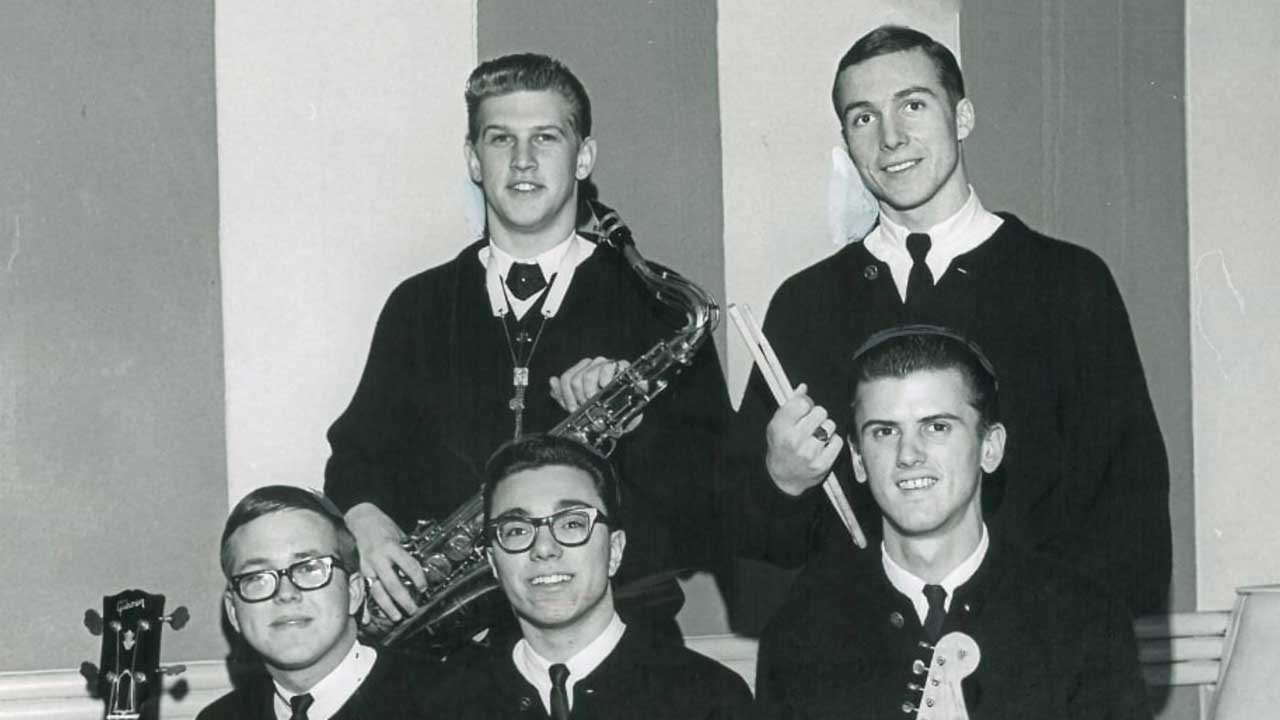In the winter of 1963, a team of FBI agents spent their days hunched over portable record players, struggling to decode a message that threatened the morality of America’s youth.
It wasn’t from the Russians or Castro, but a band of Portland teenagers called The Kingsmen. And the song was Louie Louie.
“J. Edgar Hoover felt we were corrupting the moral fiber of America’s youth,” Mike Mitchell, guitarist and founding member of The Kingsmen, told me in 2016. “The FBI guys came to our shows, and they’d stand next to the speakers to see if we were singing anything off-colour. It was a different time.”
“Louie Louie was kept out of the Number One spot on the charts by the Singing Nun,” Kingsmen keyboardist Don Gallucci told me with a laugh. “That ought to tell you the mentality of the country back then. I thought, ‘Gee, I know the lyrics. What’s the deal?’ It never occurred to me how repressed teenagers were sexually. They were hearing all this stuff in the song. The genie was getting out of the bottle.”
The world’s most infamous party song jumped out of the bottle in 1956. Penned by L.A. songwriter Richard Berry, the sailor’s lament had the singer pouring out his lovelorn heart to a bartender, Louie, over the girl he left across the ocean. The lyric’s sweet Calypso air includes couplets like “On the ship I dream she there / I smell the rose in her hair.”
Among the Ten Most Wanted Fugitives listed by the FBI in 1963 were counterfeiters, embezzlers and a bank robber who dyed his hair a different coloir every month and stuffed cotton in his nose and mouth to disguise the shape of his face.
Somewhere down the Bureau's list of offenders was a band of five teenage musicians from Portland who called themselves The Kingsmen. That spring, they had released a single called Louie Louie. And behind its feel good, three-chord groove, there were rumoured to be some salacious messages that were threatening the morality of America's youth.
“J. Edgar Hoover felt we were corrupting the moral fibre of America’s youth,” Mike Mitchell, guitarist and founding member of The Kingsmen, told me in 2016. “The FBI guys came to our shows, and they’d stand next to the speakers to see if we were singing anything off-colour. It was a different time.”
“Louie Louie was kept out of the Number One spot on the charts by the Singing Nun,” Kingsmen keyboardist Don Gallucci told me with a laugh. “That ought to tell you the mentality of the country back then. I thought, ‘Gee, I know the lyrics. What’s the deal?’ It never occurred to me how repressed teenagers were sexually. They were hearing all this stuff in the song. The genie was getting out of the bottle."
The song that had G-men hunched over portable hi-fis straining to decode the lyrics had innocent beginnings. Written and recorded in 1956 by L.A. musician Richard Berry, it was basically a sailor pouring his heart out to a bartender named Louie, lamenting the gal he left behind. The lyric, sung in a Calypso pidgin English, included couplets like: “On the ship I dream she there / I smell the rose in her hair.”
Berry had a regional hit with it in the Pacific Northwest. But like many young songwriters at the time, he couldn't see the long-term potential of hanging onto your copyrights. So when interest in Louie Louie waned, he sold the song to a publisher for $750.
In 1961, the song was revived, in a more rollicking arrangement, by Seattle band Rockin' Robin Roberts & The Wailers. That version is the one that inspired The Kingsmen to try their hand at it.
Released in May 1963 on an indie label called Jerden, it was a hit around their native Portland. And then, in a scene straight out of a movie, a DJ in Boston named “Woo Woo” Ginsburg locked himself in a studio and spun The Kingsmen’s record for three hours straight on the air. The phones lit up. 20,000 copies were sold in a week.
As the song caught on across the country, so too did rumours about its supposed dirty lyrics. Part of the urban legend that sprang up around Louie Louie said that if you spun the 45 rpm single at 33 1/3, you could hear all the offending lines more clearly. Which, for anyone old enough to remember slowing records down, is laughable. If anything, it just renders the vocal into the sound of a sleepy ogre mumbling incomprehensibly.
There was actually a reason the lyrics were hard to make out. The night before they recorded it, The Kingsmen had played a marathon gig, which left lead singer Jack Ely’s voice in ragged condition. Mike Mitchell said, “The boom microphone in the studio was fixed too high for Jack. He had to stand on his tiptoes to reach it. Also, he wore braces, so his diction wasn't great anyway. On top of that, what we thought was a rehearsal run-through turned out to be the only take of the song!”
In the spring of 1964, Louie Louie was banned from the airwaves in the entire state of Indiana. Parents, teachers and clergymen, the holy trinity of the easily offended, began to complain about the song's “x-rated” message. And at that point, the FBI started their investigation, assigning agents to decode the lyric. Though they would abandon their inquiry a year later, many of the transcriptions of what they thought they heard are now declassified documents. Couplets like “And on that chair, I lay her there / I felt my boner in her hair” perhaps say more about the overworked FBI agents than The Kingsmen.
The song’s original chart run was only the beginning. The single was re-released for three consecutive years, charting again in 1966. Over the next 10 years, it became the unofficial anthem for garage bands around the world. By 1978, when John Belushi belted it out in Animal House, it had been recorded in over 800 versions and translated into 20 different languages.
In 1983, Rhino were able to release a Best Of Louie Louie compilation that gathered together Berry's original and The Kingsmen's cover alongside recordings by the likes of the Rice University Marching Owl Band and the pithily named Les Dantz & His Orchestra. A second volume followed in 1989.
By 2000, the song had thoroughly inundated every aspect of pop culture, appearing in major motion pictures, TV shows, cartoons and commercials, in novels and non-fiction (rock scribe Dave Marsh wrote an entire book about the song), and even in the work of one modern painter. There are several Louie Louie bars, cafes and restaurants around the world, as well as a cocktail that bears the name.
“The whole record was a fluke really,” Mitchell said. “It's taken on its own life and still has its own life.”
“There was a raw honesty and intensity about it,” Gallucci added. “It caught a kind of raucous punk energy that people were really dying for.”
Finally, there was a happy ending for songwriter Richard Berry. In 1992, Berry regained the rights to his song. The following year, he got his first royalty check for it, in the amount of $2 million. He passed away five years later.
In 1993, the Kingsmen emerged from their own long court battle, with ownership of their Louie Louie master, which they had naively signed away back in 1964. Fronted by original drummer Dick Peterson, the group still plays on the oldies circuit. In 2021, when Mike Mitchell passed away, band members and friends gathered at a tribute show to play a hilariously extended version of the song. Fittingly, it was as ramshackle as the Kingsmen's.

